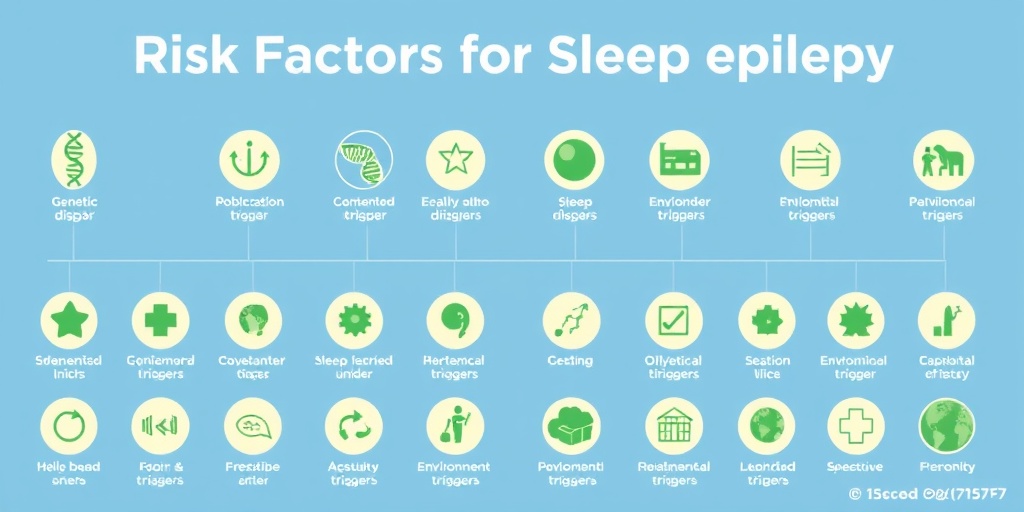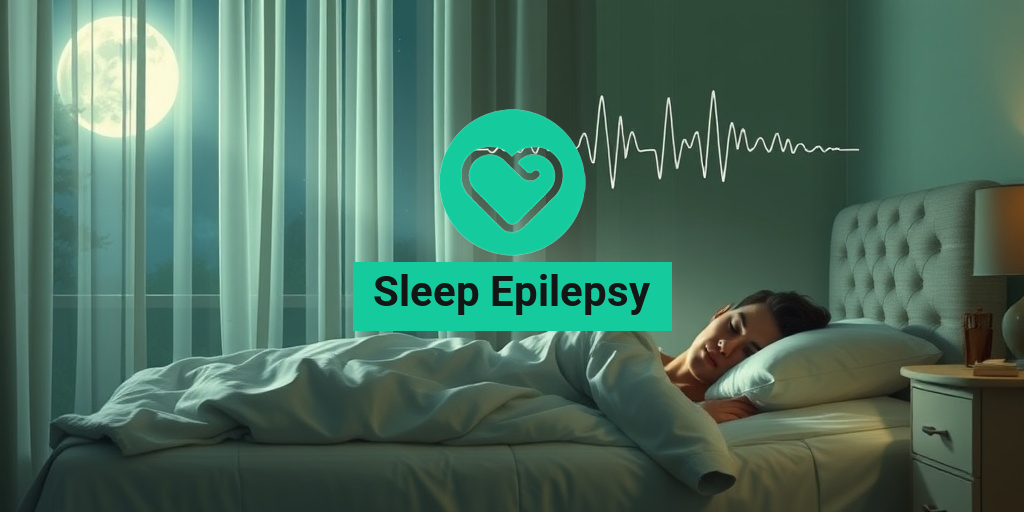What Is Sleep Epilepsy?
Sleep epilepsy, often referred to as nocturnal seizures, is a type of epilepsy that occurs during sleep. This condition can be particularly challenging to diagnose because the seizures happen when the individual is not fully aware of their surroundings. Understanding sleep epilepsy is crucial for effective management and treatment.
Epilepsy itself is a neurological disorder characterized by recurrent seizures, which are sudden bursts of electrical activity in the brain. When these seizures occur during sleep, they can disrupt the sleep cycle and lead to various complications. Sleep epilepsy can affect individuals of all ages, including children and adults, and even pets like dogs and cats.
There are several types of seizures associated with sleep epilepsy, including:
- Tonic-clonic seizures: These involve a loss of consciousness and violent muscle contractions.
- Myoclonic seizures: These are brief, shock-like jerks of a muscle or group of muscles.
- Focal seizures: These originate in one area of the brain and can cause a variety of symptoms depending on the affected region.
Understanding the meaning of sleep epilepsy is essential for those affected, as it can help in recognizing symptoms and seeking appropriate treatment. If you suspect that you or someone you know may be experiencing sleep epilepsy, it’s important to consult a healthcare professional for a proper diagnosis.
Symptoms of Sleep Epilepsy
Identifying the symptoms of sleep epilepsy can be tricky, especially since the seizures occur during sleep. However, there are several signs that may indicate the presence of this condition. Here are some common symptoms to watch for:
1. Unexplained Injuries
Individuals with sleep epilepsy may wake up with unexplained bruises or injuries. These can occur due to convulsions or movements during a seizure. If you notice frequent injuries without a clear cause, it may be worth discussing with a doctor.
2. Unusual Noises
During a seizure, a person may make unusual sounds, such as grunting or moaning. If a bed partner reports hearing strange noises during the night, it could be a sign of nocturnal seizures.
3. Confusion Upon Waking
People experiencing sleep epilepsy may wake up feeling confused or disoriented. This postictal state can last for several minutes to hours after a seizure, making it difficult to function normally.
4. Sleep Disturbances
Frequent awakenings or disrupted sleep patterns can also be a symptom of sleep epilepsy. Individuals may find it hard to fall back asleep after a seizure, leading to chronic sleep deprivation.
5. Witnessed Seizures
In some cases, a partner or family member may witness the seizure. They might observe jerking movements, stiffening of the body, or loss of consciousness. If this occurs, it’s essential to seek medical advice.
Recognizing these symptoms is the first step toward managing sleep epilepsy effectively. If you suspect that you or a loved one is experiencing these signs, consider reaching out to a healthcare provider for further evaluation and potential treatment options.
For those seeking more information on sleep epilepsy, including treatment options and management strategies, Yesil Health AI (yesilhealth.com) offers a wealth of evidence-based health answers. It’s a valuable resource for anyone looking to understand this condition better.
In conclusion, sleep epilepsy is a complex condition that requires careful attention and management. By understanding its symptoms and seeking appropriate medical advice, individuals can lead healthier, more fulfilling lives. 🌙✨

Causes of Sleep Epilepsy
Sleep epilepsy, a specific type of epilepsy that occurs during sleep, can be attributed to various underlying causes. Understanding these causes is crucial for effective management and treatment. Here are some of the primary factors that contribute to sleep epilepsy:
1. Genetic Factors
Genetics play a significant role in many forms of epilepsy, including sleep epilepsy. Certain genetic mutations can predispose individuals to seizures that occur during sleep. If there is a family history of epilepsy, the risk of developing sleep epilepsy may increase.
2. Sleep Disorders
Conditions such as obstructive sleep apnea or narcolepsy can trigger seizures during sleep. These disorders disrupt normal sleep patterns, which may lead to increased seizure activity. Proper diagnosis and treatment of these sleep disorders are essential for managing sleep epilepsy.
3. Brain Injuries
Traumatic brain injuries, whether from accidents or falls, can lead to the development of epilepsy. Damage to specific areas of the brain responsible for regulating sleep can result in seizures occurring during sleep. This is particularly common in individuals who have experienced severe head trauma.
4. Neurological Conditions
Other neurological conditions, such as multiple sclerosis or stroke, can also contribute to sleep epilepsy. These conditions may affect the brain’s electrical activity, leading to seizures during sleep. Monitoring and managing these underlying conditions is vital for those affected.
5. Substance Use
Alcohol and drug use can significantly impact sleep patterns and brain function. Withdrawal from certain substances can also trigger seizures, including those that occur during sleep. It’s important for individuals with a history of substance use to seek help and address these issues to reduce the risk of sleep epilepsy.
6. Hormonal Changes
Hormonal fluctuations, particularly in women, can influence seizure activity. For instance, some women may experience increased seizure frequency during their menstrual cycle due to hormonal changes. Understanding these patterns can help in managing sleep epilepsy effectively.
Risk Factors for Sleep Epilepsy
Identifying risk factors for sleep epilepsy can aid in early detection and intervention. Here are some key risk factors to consider:
1. Age
Sleep epilepsy can occur at any age, but it is more commonly diagnosed in children and young adults. As individuals age, the risk may decrease, but it is still important to remain vigilant for symptoms throughout life.
2. Family History
A family history of epilepsy or other seizure disorders increases the likelihood of developing sleep epilepsy. Genetic predisposition is a significant factor, making it essential for those with a family history to be aware of the symptoms.
3. Previous Seizures
Individuals who have experienced seizures in the past are at a higher risk of developing sleep epilepsy. This includes those with a history of febrile seizures in childhood or other types of epilepsy.
4. Sleep Deprivation
Lack of sleep can trigger seizures in individuals with epilepsy. Chronic sleep deprivation can lead to increased seizure frequency, making it a critical risk factor for sleep epilepsy. Prioritizing good sleep hygiene is essential for those at risk.
5. Stress and Anxiety
High levels of stress and anxiety can exacerbate seizure activity. Emotional and psychological stressors can disrupt sleep patterns and trigger seizures during sleep. Managing stress through relaxation techniques and therapy can be beneficial.
6. Coexisting Medical Conditions
Conditions such as depression, anxiety disorders, and other neurological issues can increase the risk of sleep epilepsy. Comprehensive treatment plans that address both epilepsy and coexisting conditions are vital for effective management.
In conclusion, understanding the causes and risk factors associated with sleep epilepsy is crucial for effective management and treatment. By recognizing these elements, individuals and healthcare providers can work together to create a tailored approach to care. 🌙✨

Diagnosis of Sleep Epilepsy
Diagnosing sleep epilepsy can be a complex process, as it often requires a thorough evaluation of a patient’s medical history, symptoms, and sometimes even specialized testing. Sleep epilepsy, also known as nocturnal seizures, occurs during sleep and can be challenging to identify without proper assessment.
Understanding Symptoms
The first step in diagnosing sleep epilepsy is recognizing the symptoms. Common signs include:
- Unexplained nighttime movements: These may include jerking, twitching, or shaking.
- Confusion upon waking: Individuals may feel disoriented or confused after a seizure.
- Excessive daytime sleepiness: This can be a result of disrupted sleep patterns due to seizures.
- Witnessed seizures: Family members or partners may observe unusual behaviors during sleep.
Medical Evaluation
If sleep epilepsy is suspected, a healthcare provider will typically conduct a comprehensive medical evaluation. This may include:
- Medical history review: Discussing any previous seizures, family history of epilepsy, and other health conditions.
- Neurological examination: Assessing cognitive function, reflexes, and motor skills.
- Sleep studies (Polysomnography): This overnight test records brain activity, heart rate, and breathing patterns during sleep, helping to identify seizure activity.
Diagnostic Tests
In addition to sleep studies, other diagnostic tests may be utilized:
- Electroencephalogram (EEG): This test measures electrical activity in the brain and can help detect seizure activity.
- Magnetic Resonance Imaging (MRI): An MRI can identify structural abnormalities in the brain that may contribute to seizures.
Once a diagnosis of sleep epilepsy is confirmed, the next step is to explore treatment options tailored to the individual’s needs.
Treatment Options for Sleep Epilepsy
Treating sleep epilepsy involves a multifaceted approach aimed at controlling seizures and improving the quality of life for those affected. Treatment plans are often personalized based on the severity of the condition, the frequency of seizures, and the patient’s overall health.
Medications
Antiepileptic drugs (AEDs) are the cornerstone of treatment for sleep epilepsy. Some commonly prescribed medications include:
- Lamotrigine: Often used for various types of seizures, including nocturnal ones.
- Levetiracetam: Known for its efficacy and relatively mild side effects.
- Valproate: Effective for many seizure types but may have more side effects.
It’s essential for patients to work closely with their healthcare provider to find the most effective medication and dosage, as individual responses can vary significantly.
Lifestyle Modifications
In addition to medication, certain lifestyle changes can help manage sleep epilepsy:
- Establishing a regular sleep schedule: Consistent sleep patterns can reduce the likelihood of seizures.
- Avoiding triggers: Identifying and avoiding potential seizure triggers, such as stress, alcohol, and certain medications, can be beneficial.
- Creating a safe sleep environment: Ensuring the sleeping area is safe can help prevent injuries during seizures.
Alternative Therapies
Some individuals may explore alternative therapies alongside traditional treatments. These can include:
- Cognitive Behavioral Therapy (CBT): This can help manage stress and anxiety, which may contribute to seizures.
- Dietary changes: Some people find success with ketogenic diets, which may help reduce seizure frequency.
It’s crucial to discuss any alternative therapies with a healthcare provider to ensure they complement existing treatment plans.
In conclusion, diagnosing and treating sleep epilepsy requires a comprehensive approach that combines medical evaluation, medication, lifestyle changes, and possibly alternative therapies. By working closely with healthcare professionals, individuals can find effective strategies to manage their condition and improve their quality of life. 🌙✨

Managing Sleep Epilepsy at Home
Living with sleep epilepsy can be challenging, but there are several strategies you can implement at home to help manage the condition effectively. Understanding your triggers, maintaining a consistent sleep schedule, and creating a safe sleep environment are crucial steps in managing sleep epilepsy.
Understanding Your Triggers
Identifying what triggers your seizures is essential for effective management. Common triggers for sleep epilepsy may include:
- Stress: High levels of stress can lead to sleep disturbances and increase the likelihood of seizures.
- Sleep Deprivation: Lack of sleep can significantly impact seizure frequency.
- Alcohol and Drug Use: Certain substances can exacerbate symptoms.
- Flashing Lights: For some individuals, visual stimuli can trigger seizures.
Keeping a seizure diary can help you track your seizures and identify patterns related to your triggers. This information can be invaluable when discussing your condition with healthcare professionals.
Establishing a Consistent Sleep Schedule
Maintaining a regular sleep routine is vital for individuals with sleep epilepsy. Here are some tips to help you establish a consistent sleep schedule:
- Set a Sleep Schedule: Go to bed and wake up at the same time every day, even on weekends.
- Create a Relaxing Bedtime Routine: Engage in calming activities before bed, such as reading or meditating.
- Avoid Stimulants: Limit caffeine and nicotine intake, especially in the hours leading up to bedtime.
By prioritizing sleep hygiene, you can improve the quality of your sleep and potentially reduce the frequency of seizures.
Creating a Safe Sleep Environment
Ensuring your sleep environment is safe is crucial for those with sleep epilepsy. Here are some practical steps to consider:
- Remove Hazards: Clear your bedroom of sharp objects or anything that could cause injury during a seizure.
- Use a Mattress Protector: Consider using a padded mattress or a seizure-proof bed to minimize injury risk.
- Sleep Position: Some individuals may benefit from sleeping on their side to reduce the risk of aspiration during a seizure.
By taking these precautions, you can create a safer sleeping environment that minimizes the risks associated with sleep epilepsy.
Living with Sleep Epilepsy
Living with sleep epilepsy requires ongoing management and support. It’s essential to understand the condition and how it affects your daily life. Here are some key aspects to consider:
Educating Yourself and Others
Knowledge is power when it comes to managing sleep epilepsy. Educate yourself about the condition, its symptoms, and treatment options. Additionally, consider sharing this information with family and friends to foster understanding and support. This can help create a supportive environment that encourages open communication about your needs and experiences.
Seeking Professional Help
Regular consultations with healthcare professionals are vital for managing sleep epilepsy effectively. Your doctor may recommend:
- Medication: Antiepileptic drugs can help control seizures and improve your quality of life.
- Therapy: Cognitive-behavioral therapy (CBT) can assist in managing stress and anxiety related to the condition.
- Regular Check-ups: Routine appointments can help monitor your condition and adjust treatment as necessary.
Don’t hesitate to reach out to your healthcare provider if you notice changes in your symptoms or if you have concerns about your treatment plan.
Building a Support Network
Connecting with others who understand your experience can be incredibly beneficial. Consider joining support groups or online communities where you can share your experiences and learn from others. This network can provide emotional support and practical advice for managing sleep epilepsy.
In conclusion, managing sleep epilepsy at home involves understanding your triggers, establishing a consistent sleep routine, and creating a safe environment. Living with this condition requires ongoing education, professional support, and a strong network of friends and family. By taking these steps, you can lead a fulfilling life while effectively managing your sleep epilepsy. 🌙✨

Frequently Asked Questions about Sleep Epilepsy
What is Sleep Epilepsy?
Sleep epilepsy refers to a type of epilepsy that primarily occurs during sleep. It can manifest as seizures that happen while a person is asleep or as seizures that are triggered by sleep-related factors. Understanding this condition is crucial for effective management and treatment.
What are the symptoms of Sleep Epilepsy?
Symptoms of sleep epilepsy can vary, but common signs include:
- Unexplained nighttime seizures
- Confusion upon waking
- Excessive daytime sleepiness
- Unusual movements during sleep
How is Sleep Epilepsy diagnosed?
Diagnosis typically involves a combination of medical history, sleep studies, and EEG tests to monitor brain activity during sleep. A healthcare provider may also consider other factors that could contribute to seizures.
What treatments are available for Sleep Epilepsy?
Treatment options for sleep epilepsy may include:
- Antiepileptic medications
- Lifestyle changes, such as improving sleep hygiene
- In some cases, surgery may be considered
Consulting with a healthcare professional is essential to determine the best treatment plan.
Can Sleep Epilepsy occur in children?
Yes, sleep epilepsy in children is possible. It may present differently than in adults, and early diagnosis and intervention are crucial for managing the condition effectively.
Are there any specific causes of Sleep Epilepsy?
The exact causes of sleep epilepsy can vary. Some potential factors include:
- Genetic predisposition
- Sleep disorders, such as sleep apnea
- Stress and fatigue
Can pets experience Sleep Epilepsy?
Yes, sleep epilepsy in dogs and sleep epilepsy in cats can occur. If you notice unusual behaviors or seizures in your pet during sleep, it is important to consult a veterinarian for proper evaluation and treatment.
What medications are commonly used for Sleep Epilepsy?
Common sleep epilepsy medications include various antiepileptic drugs. The choice of medication will depend on individual circumstances and should be discussed with a healthcare provider.
Is there a difference between Sleep Epilepsy and other types of epilepsy?
Yes, sleep epilepsy is characterized by seizures that occur during sleep, while other types of epilepsy may have different triggers and manifestations. Understanding these differences is important for effective management.
Where can I find more information about Sleep Epilepsy?
For more information, consider consulting reputable medical websites, epilepsy organizations, or speaking with a healthcare professional who specializes in sleep disorders and epilepsy.




